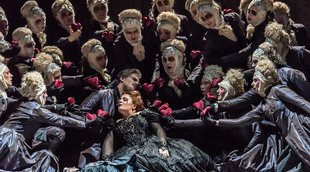 © Clive Barda
© Clive Barda
The Wexford Festival has gained recognition and highly regarded reputation for performing rarities of all centuries in high quality directions and staging. Every year since 65 years, unknown or forgotten composers or compositions come back to life. So the little city of Wexford at the South east end of Ireland has become a pilgrimage place for opera lovers for two weeks end of October.
A new opera house, actually the only opera house in Ireland, has been rebuilt recently to house the festival.
Gaetano Donizetti was a very active and hardworking composer, who finished many operas but only some remained on the billboard of the opera houses. Now and then, efforts are made to bring back some of the unknown works on to stage to refresh memories or to be different. Maria de Rudenz is one of his later operas and premiered 1838 in Venice without success -- but not unexpected. Gaetano Donizetti and his librettist were busy working on different projects and could not really find the right story to base the new opera on. 'The Nonne sanglante' a play by Anicet Bourgeois was selected, an extravagant melodrama full of crimes and blood, not too much the taste of the Venetians and badly adapted in the libretto of the opera.
Maria in love with Corrado has been abandoned by him in the Catacombs in Rome. Being considered dead, her cousin Matilda, now in love with Corrado should be the heir of Maria's father and family due to her absence. Just in time, Maria appears back in the family castle to destroy the marriage plan and to murder the possible heiress. She herself still in love with Corrade but fails to win his love back even by threatening him to reveal his real ancestry of a decapitated father and murderer. This in brief and some additional rivalries and murder enrich.

Maria de Rudenz - Wexford Festival 2016
Thanks to a fascinating concept and fine elaborated realisation by director Fabio Ceresa and his team the clumsy composition is fresh up, faces a logical order and is not short of cynical and some comic injections. Fabio Ceresas layout is that of a fairytale being narrated in a puppet theatre. Everybody on stage is a puppet himself, some of the protagonists have puppets in there dress, additional puppets are sitting or lying around.
Everything happens in the castle of the Rudenz family, which is brilliantly designed as a puppets house by Gary Mc Cann. Some rotating blocks can be moved together showing different rooms, stairs and create a marvellous setting. Giuseppe Palella added elegant flashy historical costumes and worked out pointed mask for everybody. The horrible and brutal crimes look different in this perspective of a played fairy tale: some gags can be naturally included and neutralize the blood – which everybody appreciates.
Andrew Greenwood joined as musical director with a sumptuous musical narration. It is fluent with a vivid speed, no oversteering in volume and an Italian colour in instrumentation, battery and string in a slight dominance. Gilda Fiume marks a very present Maria, not just because of her apparence, her head full of coagulated blood, a mystical make up and bell-bottomed historical dresses. It's her dramatic dark soprano flawless climbing up heights and stressed with virulent legati. Her coloraturas are minor elegant which she knows to hide. Sophie Gordeladze, as her rival Matilda, can’t really position herself as Matilde next to her – as well as Joo Won Kang as the fatal beloved Corrado: his baritono is fine but it lacks expression and knowledge in his Italian. Jesus Garcia as Enrico has to deplore, with his fresh and warm tenor, his unfortunate destiny of loving Matilda before passing away in a duel with Corrado.
The opera ends in full horror and sorrow on stage and frenetic applause in the audience. The concept fully convinces as does the musical performance.
Helmut Pisch
the 31 of October, 2016 | Print
Comments